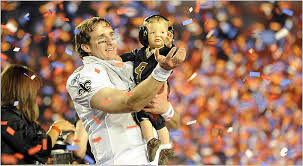In a league dominated by physical prototypes and athletic extremes, Drew Brees never quite fit the mold. At just six feet tall short by NFL quarterback standards with average arm strength and no standout athletic features, Brees was seen as a long shot in a position often reserved for the tall, strong, and flashy. And yet, over the course of two decades, he not only shattered records but fundamentally changed the way the quarterback position is viewed in modern football.
More than just a prolific passer, Drew Brees became a symbol of precision, resilience, leadership, and heart. His legacy is not only defined by statistics but also by the indelible impact he left on the game, the city of New Orleans, and the generations of quarterbacks who followed in his footsteps.
Early Doubts, Early Grit
Born in Austin, Texas, in 1979, Drew Brees didn’t grow up with the advantages many elite athletes enjoy. Despite a stellar high school career and a record-breaking run at Purdue University, doubts lingered about his pro potential. At the 2001 NFL Draft, teams questioned his size, arm strength, and ability to succeed against NFL defenses. He was ultimately selected by the San Diego Chargers in the second round not the most confident vote of faith for a quarterback with his college pedigree.
His early NFL career was rocky. Brees showed flashes of brilliance but struggled with consistency. Then, in 2005, disaster struck. A devastating shoulder injury in the final game of the season a complete tear of his labrum required major surgery. Many assumed his career was over.
A New Home and a New Beginning
Only one team believed in him: the New Orleans Saints, a franchise in desperate need of a leader after Hurricane Katrina had ravaged the city and shaken its identity. What followed was one of the greatest comebacks and partnerships in sports history.
From 2006 onward, Brees didn’t just revive his career; he elevated the Saints to heights they had never seen before. He led the NFL in passing yards seven times, broke countless records, and brought stability, pride, and energy to a city that was rebuilding not only its team but its soul.
The Super Bowl That Changed Everything
The pinnacle of Brees’s career came in February 2010, when he led the Saints to their first-ever Super Bowl victory. In Super Bowl XLIV, he outdueled Peyton Manning and orchestrated a comeback win that electrified a fanbase long starved for success. Brees was named Super Bowl MVP, completing 32 of 39 passes a nearly flawless performance under the brightest lights.
But more than just a championship, that victory represented a turning point for New Orleans. In the aftermath of Katrina, the city clung to the Saints as a symbol of resilience. Brees wasn’t just the face of a franchise he was the heart of a city.
Changing the Quarterback Position
While Tom Brady and Peyton Manning were celebrated for their dominance, Brees was revolutionizing how quarterbacks could succeed. He showed that success didn’t depend on size or athletic gifts but on preparation, precision, and decision-making. His mastery of the short and intermediate passing game, particularly his ability to read defenses and throw with impeccable timing, set new standards for the position.
He retired with 80,358 passing yards an NFL record at the time and 571 touchdown passes. He still holds the all-time single-season completion percentage record at 74.4% (2018), a testament to his accuracy and understanding of the game.
More importantly, Brees changed how scouts, coaches, and teams evaluate quarterbacks. Players like Russell Wilson, Kyler Murray, and even current stars like Bryce Young owe part of their opportunity to the path Brees paved.
More Than a Football Player
Brees’s influence extended far beyond the gridiron. Off the field, he established himself as one of the NFL’s most respected leaders and philanthropists. Through the Brees Dream Foundation, he has donated over $35 million to causes related to cancer research, education, and rebuilding communities. He became a beacon of hope for countless people, using his platform to uplift and inspire.
In locker rooms, he was known as the ultimate competitor methodical in his preparation, tireless in his effort, and fiercely devoted to his team. Teammates respected his humility and work ethic as much as his talent.
Legacy: A Quiet Giant in a Loud Game
Drew Brees didn’t seek the spotlight, but he earned it. His career is a testament to how leadership, intelligence, discipline, and heart can overcome limitations others see as disqualifiers. He proved that greatness doesn’t always roar sometimes, it leads with quiet confidence, daily consistency, and unwavering belief.
When he retired in 2021, the NFL lost not just one of its most productive passers but one of its most transformative figures. Today, Brees remains active as an analyst, mentor, and community leader still influencing the game and the world around him.
For all the records and rings, Brees’s greatest achievement may be how he redefined what’s possible not just for quarterbacks, but for anyone told they’re not “enough” to chase greatness.

